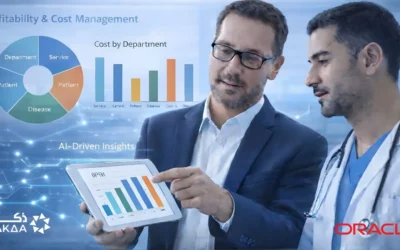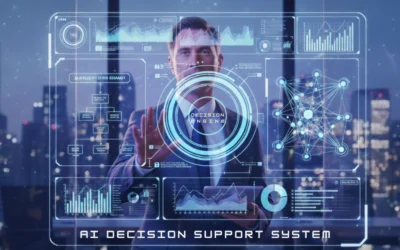Last Wednesday evening in Riyadh, the Middle East’s top government and enterprise leaders gathered at the DoubleTree Hotel. Along with great minds, CIOs, CFOs, CHROs, planning directors, budget heads, and Chief Data & Analytics Officers—the people who actually make the big decisions and lead the Vision 2030 transformation initiatives.
The Setup: 5 Decision-Making Challenges Questions.
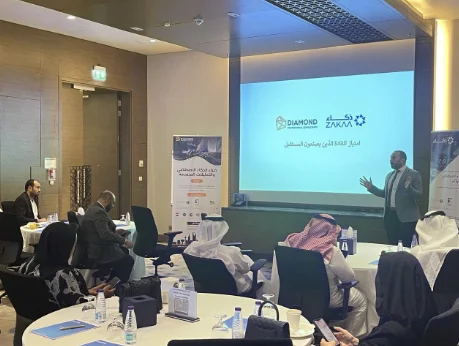
Before introducing the Diamond Group’s product, ZAKAA, and its benefits for decision-makers, we conducted a live poll with five questions about decision-making challenges in their organizations.
To know about what’s working and what’s not for them.
Question 1: What’s Your Biggest Challenge When Making Quick Decisions?
We gave them four options:
- A. Poor data accuracy
- B. Delayed internal approvals
- C. Conflicting information between departments
- D. Lack of intelligent decision support tools
The Results:
- Poor data accuracy: 4
- Delayed internal approvals: 3
- Conflicting information between departments: 7
- Lack of intelligent decision support tools: 5
What This Means:
Conflicting information between departments won by a clear margin. This isn’t a technology problem—it’s an organizational reality.
One planning director put it plainly during the discussion: “We have five different systems. Finance sees one number. Operations sees another. Planning uses a third. When we sit in executive meetings, we spend the first 30 minutes just reconciling which numbers are correct.”
Several members agree about this challenge around the room. Everyone had lived this. Did you as well?
The lack of intelligent decision support tools came in second. Leaders have data and systems, but those systems aren’t helping them decide—they’re just showing information.
Question 2: Where Does the Biggest Delay Happen in Your Decision Cycle?
The options:
- A. Data collection and analysis
- B. Review and approval of reports
- C. Accessing the right information at the right time
- D. Multiple stakeholders are involved in the decision
The Results:
- Data collection and analysis: 5
- Review and approval of reports: 2
- Accessing the right information at the right time: 4
- Multiple stakeholders involved in decisions: 5
What This Reveals:
The responses split evenly between “data collection and analysis” and “multiple stakeholders involved.” This shows a picture of two parallel bottlenecks:
First, getting the data ready takes too long. Even with systems in place, pulling together information from different sources, verifying accuracy, and analyzing it wastes time.
Second, coordination across stakeholders slows everything down. Vision 2030 goals require cross-ministry collaboration. But when different ministries use different systems and track different metrics, alignment becomes a project in itself.
“We have brilliant people and good data,” one leader said. “But connecting the dots fast enough? That’s where we struggle.”
Question 3: What’s Most Important for Improving Government Decision Quality?
The choices:
- A. Accurate and updated data availability
- B. AI platform that suggests scenarios
- C. Reducing bureaucracy and speeding approvals
- D. Training staff on data analysis and decision-making
The Results:
- Accurate and updated data: 7
- AI platform suggesting scenarios: 4
- Reducing bureaucracy: 3
- Training staff: 3
The Priority is Clear:
Seven out of 19 leaders—more than a third—chose accurate and updated data as the top priority. Before AI can help, before bureaucracy can be reduced, before training makes a difference, you need to trust your data.
As you know, garbage in = garbage out!
This connects directly to the first question’s results. If information conflicts between departments, no amount of AI sophistication matters. You’re building on a shaky foundation.
During the coffee break, a CFO shared: “We can have the most advanced AI in the world. But if I can’t trust that the numbers it’s showing me are the same numbers my colleagues are seeing, what’s the point?”
That’s when the conversation shifted to what became the evening’s most important topic.
The Single Version of Truth Conversation.
Play
Around 8:45 PM, during a discussion about ZAKAA’s – (a product of Diamond Group – 𝘛𝘩𝘦 𝘍𝘪𝘳𝘴𝘵 𝘈𝘳𝘢𝘣𝘪𝘤–𝘥𝘳𝘪𝘷𝘦𝘯 𝘈𝘐 𝘋𝘦𝘤𝘪𝘴𝘪𝘰𝘯 𝘚𝘶𝘱𝘱𝘰𝘳𝘵 𝘚𝘺𝘴𝘵𝘦𝘮 𝘪𝘯 𝘵𝘩𝘦 𝘔𝘪𝘥𝘥𝘭𝘦 𝘌𝘢𝘴𝘵) data warehouse foundation, a member raised the concern that was the center of attention for the whole evening:
“What we need is a single version of truth. One platform where everyone looks at the same data, updated in real-time, governed properly. When leaders can’t trust that they’re all looking at the same information, decision-making becomes political instead of analytical.”
The room went quiet!
Another executive added: “If we solve this one problem—just this one—half our decision-making delays disappear.”
This isn’t about fancy AI features or impressive dashboards. It’s about basic trust in the information you’re using to make decisions that affect citizens’ lives.
ZAKAA’s Bianat module (AI Data Lakes & Governance) addresses exactly this. It creates that single version of truth by:
→ Integrating data from multiple systems automatically.
→ Ensuring real-time synchronization across departments.
→ Building governance into the foundation, not adding it later.
→ Making sure everyone—from analysts to ministers—sees the same numbers.
“This alone would bring hours of every week in minutes to be done,” a member mentioned after seeing the ZAKAA’s Bianat Module.
Question 4: How Effective Are Your Current Analytical Tools?
The options:
- A. Very effective
- B. Partially effective
- C. Limited effectiveness
- D. Not effective
The Results:
- Very effective: 2
- Partially effective: 3
- Limited effectiveness: 3
- Not effective: 0 leaders
The Uncomfortable Reality:
Only 2 out of 19 members found their current tools “very effective.” The rest fell somewhere in the middle—tools that work somewhat, but don’t deliver the speed and confidence leaders need.
Note that zero leaders chose “not effective.” Organizations have invested in tools. Those tools do something. But they’re not solving the real problem.
“I don’t need more dashboards,” one senior official explained. “I need answers. What happened? Why? What should I do? Current tools make me work too hard to get there.”
This is where ZAKAA comes in. Instead of giving you more data to analyze, it answers the four questions every leader asks:
✦ What happened?
✦ Why did it happen?
✦ What will happen next?
✦ What should be done next?
All in Arabic. All backed by reasoning you can verify. All connected to compliance frameworks that government work requires.
Question 5: If You Could Preview Decision Outcomes Before Implementation, How Would That Affect You?
The final question gave them:
- A. Increases decision confidence
- B. Reduces risks
- C. Increases execution speed
- D. All of the above
The Results:
- Increases decision confidence: 4
- Reduces risks: 2
- Increases execution speed: 2
- All of the above: 6
What Leaders Actually Want:
Six leaders—nearly a third—chose “all of the above.” They don’t want just one benefit. They want confidence AND risk reduction AND speed.
This question revealed something critical: leaders don’t want AI to make decisions for them. They want AI that helps them make better decisions with full visibility into the reasoning.
“I’m accountable for every decision,” one member said. “Every mistake is public. Every choice affects citizens. If AI can show me what’s likely to happen before I commit—with reasoning I can understand and verify—that changes everything.”
That statement captured the evening’s theme: trust.
Why Trust Became the Real Conversation?
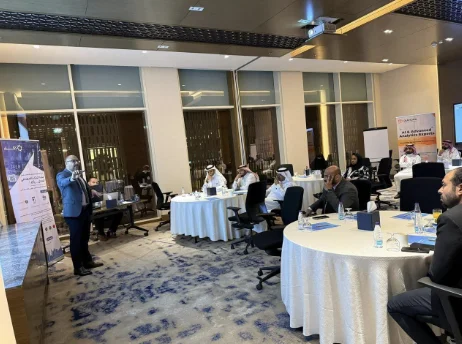
One question kept coming in during the event: “How do we trust AI recommendations when we’re accountable for the decisions?”
Here’s how ZAKAA earns that trust:
➤ Transparency: Every recommendation shows its reasoning. No black box decisions. You can see exactly why the system suggests what it suggests.
➤ Regulatory Foundation: Built on actual compliance frameworks and government standards. The system knows the rules because they’re embedded in its architecture—not added as an afterthought.
➤ Proven Track Record: Diamond Group has been implementing government solutions for over years across Saudi Arabia, UAE, USA, Egypt, South Africa, Kenya, and China.
➤ Certifications: Official approvals and certifications from relevant government bodies and international standards (ISO 9001:2015, ISO 21001:2018, ISO 45001:2018, and more).
“I don’t need AI to make decisions for me,” one senior official explained. “I need AI that helps me make better decisions, with full confidence in where those recommendations come from.”
What ZAKAA AI Decision Support System Actually Does?
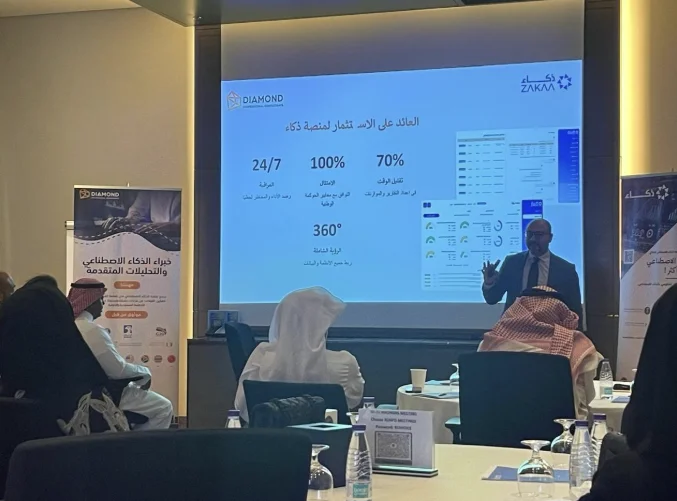
After the polls and discussions, we showed them the platform.
ZAKAA serves as an intelligent advisor that tells you:
- What happened (descriptive intelligence)
- Why it happened (diagnostic intelligence)
- What will happen next (predictive intelligence)
- What should be done next (prescriptive intelligence)
All-in-one Arabic-driven AI Decision Support System. All with real-time insights. All with full transparency and ministry compliance.
The Platform includes Six Modules That Changed the Conversation.
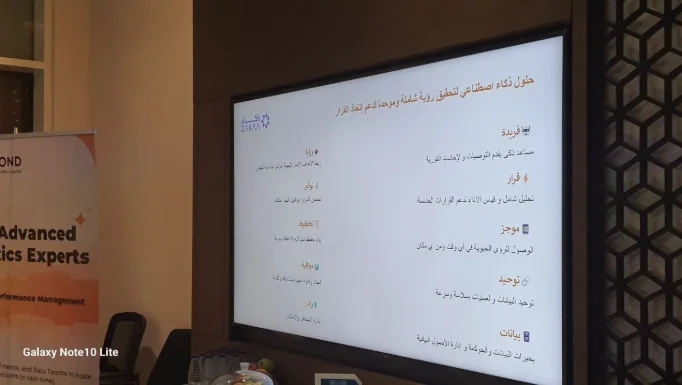
- Ro’ya (Vision): Connects Vision 2030 goals to your department’s daily projects. One CDAO called it “the missing link between strategy and execution.”
- Takhteet (Planning): Predicts workforce needs before they become crises. Three CHROs spent the coffee break discussing this module. The word they kept using: “proactive.”
- Mezania (Budget): Automates budget preparation according to the State’s General Budget Execution Manual. One CFO quietly calculated: “Three weeks. We could get three weeks back every budget cycle.”
- Bianat (Data Lakes): Creates that single version of truth everyone was asking for. Integrated data warehouse with automated ETL processes and real governance.
- Qarar (Decision Intelligence): The core brain where data becomes actionable answers to those four critical questions.
- Twfeer (Cost Management): Optimizes AI investments and operational efficiency.
- Twheed (Consolidation): Consolidates complex data structures faster and more accurately.
- Radar (Risk & Compliance): Monitors everything 24/7. Catches problems before they become disasters. Escalates issues automatically based on severity.
- Farida (AI Consultant): Your intelligent assistant that learns your business and provides contextual advice.
- Mwjz (Mobile Intelligence): Decision intelligence in your pocket. “I’m in back-to-back meetings most days,” one deputy minister explained. “I need something I can check between sessions that tells me what actually matters and what I should do about it.”
How is ZAKAA aligned with Vision 2030?

Then the conversation moved to something bigger than just our company. Vision 2030 isn’t just about economic growth. It’s about fundamental transformation—moving from a resource-based economy to one powered by AI systems, IoT, knowledge, data, algorithms, sensors, robotics, and human capital.
ZAKAA Vision:
To become the most trusted Advanced Analytics and Decision Intelligence platform for governments and enterprises, where AI-driven insights empower leaders to make the right decisions at the right time, shaping industries, fueling economies, and changing lives.
ZAKAA Mission:
To empower top management with intelligent real-time decision-making capabilities by transforming data and expertise using AI, BI, and EPM into a single cloud platform that automates planning, budgeting, reporting, forecasting, and prediction to achieve management excellence.
As Hatem Elkady, CEO of Diamond Group, shared: “ZAKAA doesn’t replace human beings. It enables them to make decisions 10 times faster. And we will begin to expand in the Gulf.”
This isn’t just about technology—it’s about building KSA’s position as a regional leader in digital transformation. It’s a movement, a mindset, an intelligence for those who lead.
ZAKAA Fits Directly into that Vision in Five Ways:
→ Knowledge & Data-Driven Economy – AI becomes the foundation, not just a tool.
→ National AI Infrastructure & Ecosystem – Major investments in data centers, research, and talent are creating the regional and global AI leadership the Kingdom envisions.
→ Digital Government Transformation – Using AI to make government more efficient, improve decision-making, and enhance public services with better data governance.
→ Sectoral Innovation & Diversification – Bringing AI to energy, health, education, and logistics. Making every sector smarter and more diverse.
→ Talent Development & Human Capital – Preparing our workforce through AI education, up-skilling, and awareness. Making sure people are ready for what’s coming.
Diamond Professional Consultants: At the Forefront of Digital Transformation.
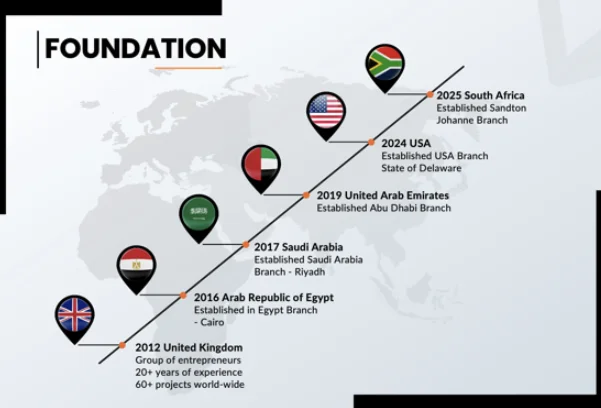
Since 2012, we’ve been helping organizations across the Middle East embrace digital transformation. With over 60 projects worldwide and 20+ years of experience, our expansion now includes:
- 2016: Egypt Branch (Cairo).
- 2017: Saudi Arabia Branch (Riyadh).
- 2019: UAE Branch (Abu Dhabi).
- 2024: USA Branch (Delaware).
- 2025: South Africa Branch (Sandton, Johannesburg).
- 2025: Kenya (Nairobi, Kilimani Wood Avenue).
- 2025: China.
Trusted by Industry Leaders.
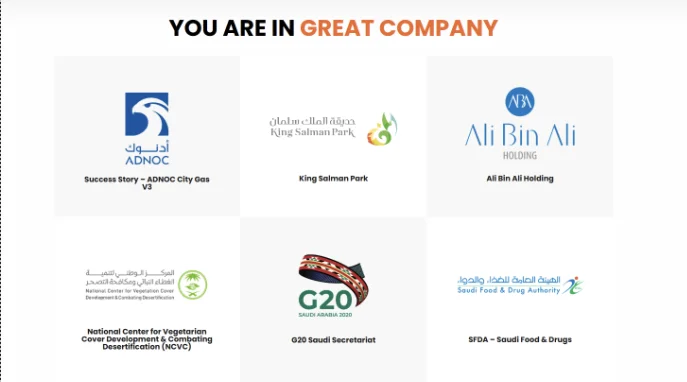
Our references include major organizations like ADNOC, the Saudi Ministry of Finance, G20 Saudi Secretariat, and Egypt’s Ministry of Energy.
What Happens Next?
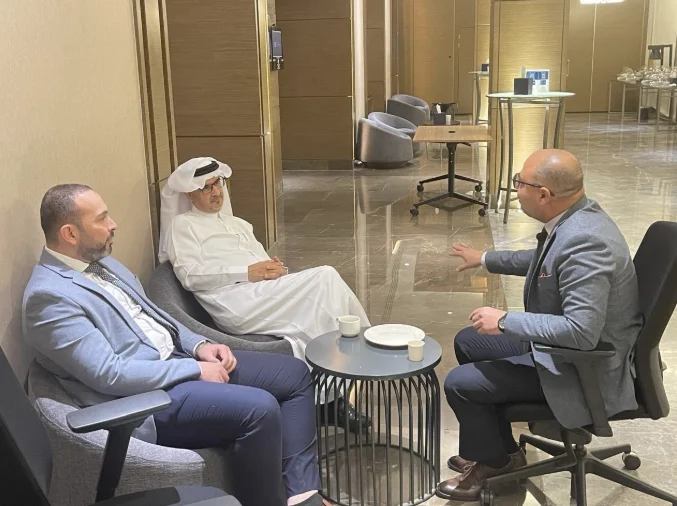
The evening wrapped up around 10 PM. Members stayed late, asking detailed questions about implementation timelines, integration requirements, and pilot programs.
Three members requested follow-up meetings. Two asked about technical architecture. One wanted to discuss a proof-of-concept project.
This is how real transformation happens. Not from vendors pitching solutions, but from practitioners sharing what actually works and leaders recognizing when technology solves their actual problems.
Thank You, Everyone, for Joining the Governmental AI Forum Riyadh 2025.
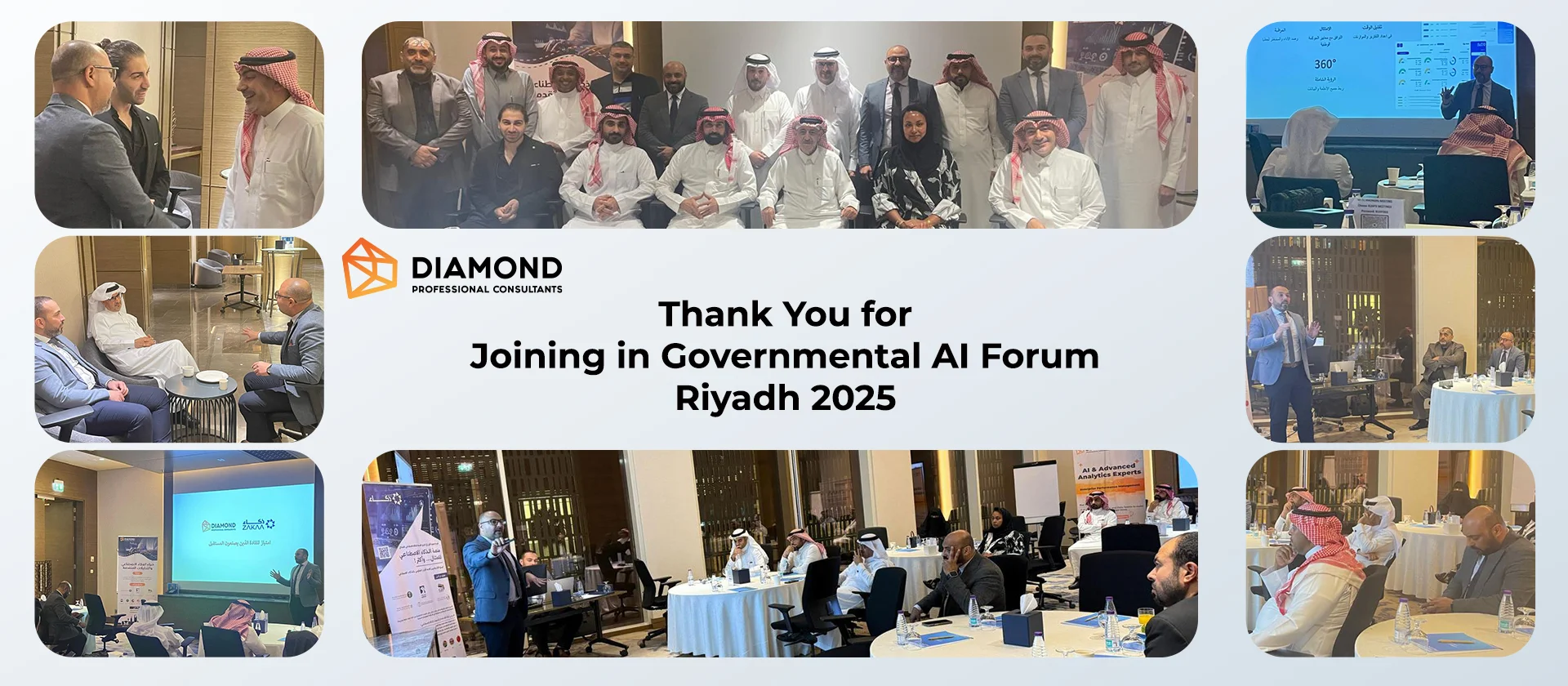
Sara Moawad, Abdulrahman Alsorayea, Zabin Alharbi, and all the executives and visionary minds who joined us on October 22, Wednesday evening—thank you.
Thank you for bringing hard questions. For sharing what’s not working. For pushing back when something needed clarification. For staying engaged. Your questions, insights, and honest feedback will speed up our innovation. These conversations matter. They’re how transformation actually happens.
The next forum is already being planned in Abu Dhabi in November 2025. If you’re working on digital transformation in the government and enterprise sectors and want to be part of the conversation, reach out.
H2: Want to learn more about ZAKAA?
📧 Contact Us: hello@diamond-dpc.com
🌐 Visit us at: diamond-dpc.com
🔗 Follow Diamond Insights on LinkedIn for more industry insights, the latest trends & innovations – you need to make smarter data-driven decisions.
ZAKAA – Intelligence Everywhere!
Diamond Professional Consultants – Grow Better. Develop Better. Deliver Better


